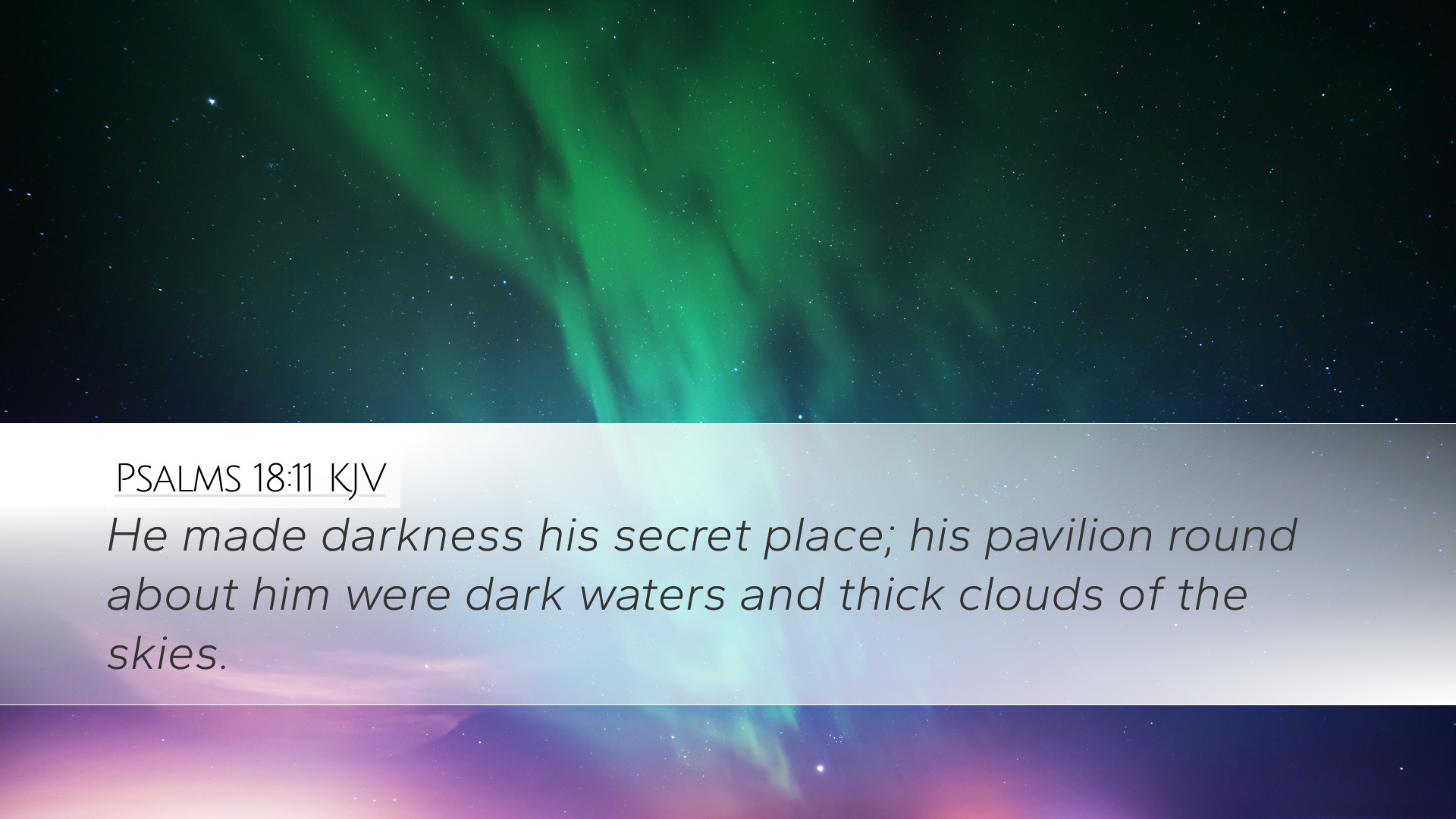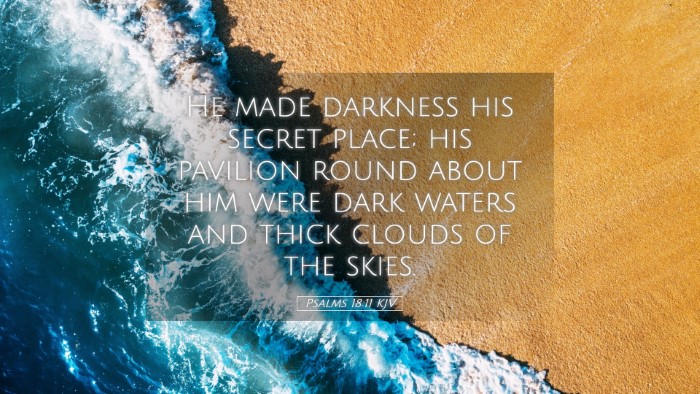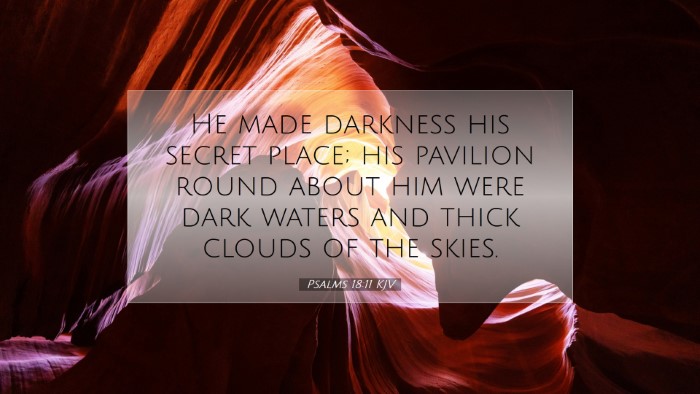Commentary on Psalms 18:11
Bible Verse: "He made darkness his secret place; his pavilion round about him were dark waters and thick clouds of the skies." (Psalm 18:11)
Introduction
This profound verse from Psalm 18 reflects the mysterious and often unapproachable nature of God. The imagery of darkness, clouds, and thick waters suggests that God's ways and workings are often hidden from human understanding. As we dive into the commentary on this verse, we seek to unearth the richness of its meaning through the insights of revered public domain commentators such as Matthew Henry, Albert Barnes, and Adam Clarke.
Matthew Henry's Insights
Matthew Henry, in his renowned commentary, emphasizes the protective and sovereign nature of God illustrated in this verse. He notes that darkness serves as a secret place where God often operates outside of human visibility and comprehension. This physical representation of God using darkness is not to be interpreted as evil or negative; rather, it illustrates that God can conceal His purposes and presence within the thick clouds, where human senses cannot reach.
Henry elaborates on the significance of "dark waters," interpreting them as a symbol of overwhelming circumstances that threaten to engulf believers. However, through this imagery, he concludes that even in seemingly adverse situations, God remains sovereign and is a refuge for His people. This darkness is part of His divine strategy to protect and shield His faithful from the dangers known only to Him.
Albert Barnes' Interpretation
Albert Barnes views this verse as a testament to the obscurity in which God often resides, aligning with Henry’s thoughts but adding a distinct nuance. He explains that the “secret place” signifies more than mere physical concealment—it's a metaphor for divine mystery. Barnes asserts that God shrouds Himself in mystery not to keep us at a distance but to invite us into deeper relationship through faith. This depth of relationship allows believers to trust Him even when His workings are not visible.
Furthermore, Barnes argues that the description of “dark waters” indicates that God's providential care encompasses all aspects of life, sometimes allowing trials that seem chaotic or tumultuous. The thick clouds serve not only as a barrier, but also as a safeguard, ensuring that the follower’s path is directed according to God's perfect will, contributing to spiritual growth and reliance on divine guidance.
Adam Clarke’s Perspective
Adam Clarke takes a more theological approach by discussing the cultural and historical context of darkness in the Scriptures. He articulates that darkness often symbolizes judgment or a period of spiritual obscurity in many biblical narratives. However, in Psalm 18:11, Clarke draws attention to the dual nature of darkness—not only as a place of concealment but also as a source of divine empowerment.
He highlights that God’s use of darkness can also signify strength and protection, offering a refuge from enemies. In Clarke's view, the “pavilion” indicates a royal encampment or representation of God’s majesty, suggesting that even amidst darkness, God’s glory is present, providing comfort and security for His people. Clarke encourages readers to embrace this image of God, seeing Him as both protector and leader, even when circumstances feel obscure and tumultuous.
Theological Reflections
Psalms 18:11 not only describes God’s nature but also serves as an invitation to explore the depths of one’s faith amidst uncertainties. This verse reminds pastors, students, theologians, and Bible scholars of the importance of understanding God’s character as one that is often enveloped in mystery yet ever-present.
- Divine Mystery: Embracing the mystery of God allows for a deeper relationship with Him, even when understanding or clarity is not apparent.
- Protection in Trials: Recognizing that God is a refuge in darkness signifies that adverse circumstances can bring believers closer to Him.
- Call to Faith: The imagery encourages believers to trust God’s sovereignty and providence, even when their situations seem overwhelming.
Practical Applications
As we consider the implications of Psalm 18:11, we can derive several practical applications for the lives of believers:
- Finding Solace in Silence: Just as God used darkness as His secret place, believers can seek solace in quiet moments of prayer and meditation, trusting that God is working even when unseen.
- Courage During Trials: When faced with dark waters, let this verse be a reminder that God’s presence is assuring, and His purpose will ultimately prevail.
- Encouragement in Community: Pastors and leaders can encourage their congregations by teaching on the transformative power of faith during periods of uncertainty, reflecting on the protective nature of God.
Conclusion
Psalms 18:11 encapsulates the duality of God's presence in our lives. While He may be shrouded in darkness and secrecy, He is also a source of comfort, protection, and strength. The commentaries from Henry, Barnes, and Clarke collectively affirm that believers can find assurance in knowing that God, even in His hiddenness, is actively working on their behalf. As students of the Word, let us continue to explore the depths of God’s nature and embrace the beautiful mystery of His presence with us.


